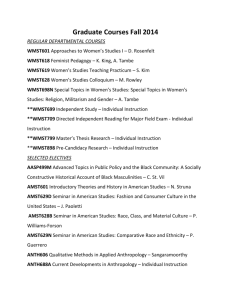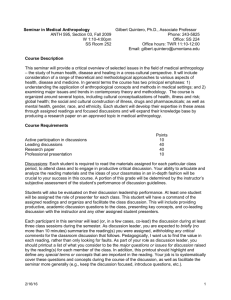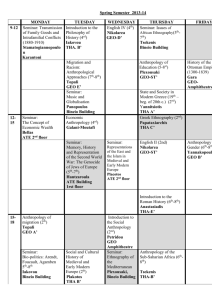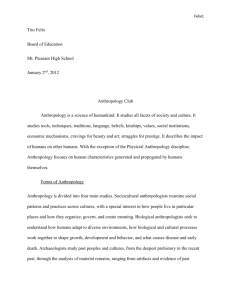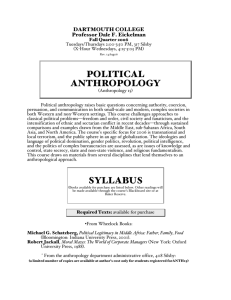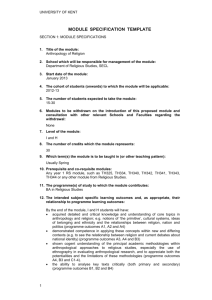ANTH 452 Senior Seminar in Anthropology The Anthropology of
advertisement
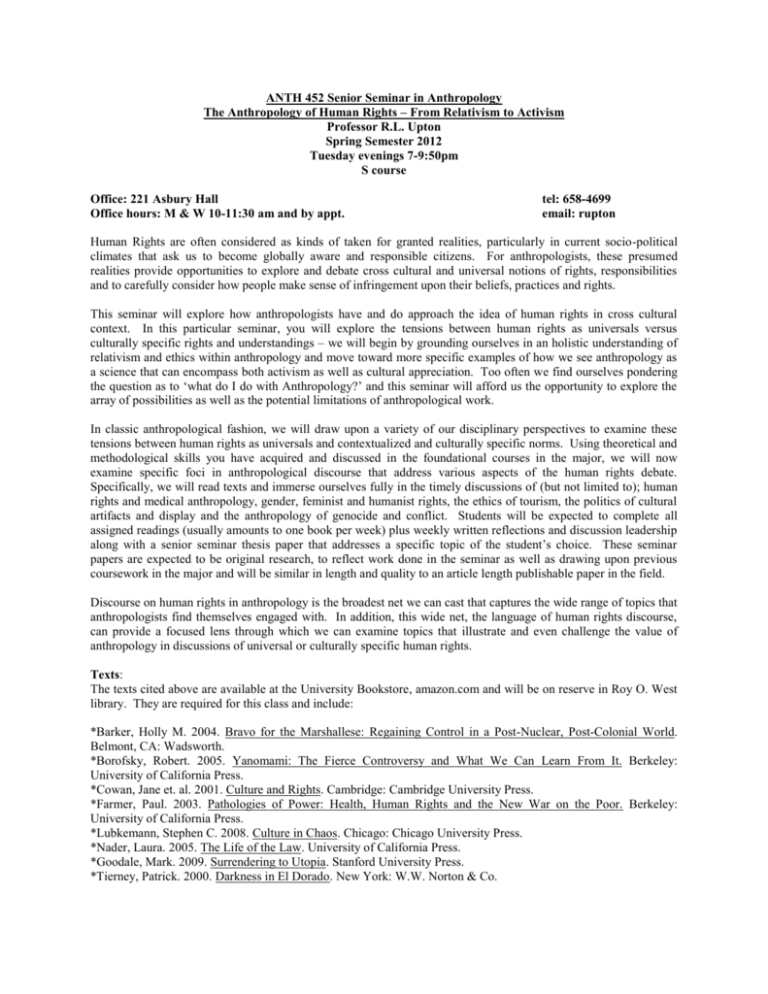
ANTH 452 Senior Seminar in Anthropology The Anthropology of Human Rights – From Relativism to Activism Professor R.L. Upton Spring Semester 2012 Tuesday evenings 7-9:50pm S course Office: 221 Asbury Hall Office hours: M & W 10-11:30 am and by appt. tel: 658-4699 email: rupton Human Rights are often considered as kinds of taken for granted realities, particularly in current socio-political climates that ask us to become globally aware and responsible citizens. For anthropologists, these presumed realities provide opportunities to explore and debate cross cultural and universal notions of rights, responsibilities and to carefully consider how people make sense of infringement upon their beliefs, practices and rights. This seminar will explore how anthropologists have and do approach the idea of human rights in cross cultural context. In this particular seminar, you will explore the tensions between human rights as universals versus culturally specific rights and understandings – we will begin by grounding ourselves in an holistic understanding of relativism and ethics within anthropology and move toward more specific examples of how we see anthropology as a science that can encompass both activism as well as cultural appreciation. Too often we find ourselves pondering the question as to ‘what do I do with Anthropology?’ and this seminar will afford us the opportunity to explore the array of possibilities as well as the potential limitations of anthropological work. In classic anthropological fashion, we will draw upon a variety of our disciplinary perspectives to examine these tensions between human rights as universals and contextualized and culturally specific norms. Using theoretical and methodological skills you have acquired and discussed in the foundational courses in the major, we will now examine specific foci in anthropological discourse that address various aspects of the human rights debate. Specifically, we will read texts and immerse ourselves fully in the timely discussions of (but not limited to); human rights and medical anthropology, gender, feminist and humanist rights, the ethics of tourism, the politics of cultural artifacts and display and the anthropology of genocide and conflict. Students will be expected to complete all assigned readings (usually amounts to one book per week) plus weekly written reflections and discussion leadership along with a senior seminar thesis paper that addresses a specific topic of the student’s choice. These seminar papers are expected to be original research, to reflect work done in the seminar as well as drawing upon previous coursework in the major and will be similar in length and quality to an article length publishable paper in the field. Discourse on human rights in anthropology is the broadest net we can cast that captures the wide range of topics that anthropologists find themselves engaged with. In addition, this wide net, the language of human rights discourse, can provide a focused lens through which we can examine topics that illustrate and even challenge the value of anthropology in discussions of universal or culturally specific human rights. Texts: The texts cited above are available at the University Bookstore, amazon.com and will be on reserve in Roy O. West library. They are required for this class and include: *Barker, Holly M. 2004. Bravo for the Marshallese: Regaining Control in a Post-Nuclear, Post-Colonial World. Belmont, CA: Wadsworth. *Borofsky, Robert. 2005. Yanomami: The Fierce Controversy and What We Can Learn From It. Berkeley: University of California Press. *Cowan, Jane et. al. 2001. Culture and Rights. Cambridge: Cambridge University Press. *Farmer, Paul. 2003. Pathologies of Power: Health, Human Rights and the New War on the Poor. Berkeley: University of California Press. *Lubkemann, Stephen C. 2008. Culture in Chaos. Chicago: Chicago University Press. *Nader, Laura. 2005. The Life of the Law. University of California Press. *Goodale, Mark. 2009. Surrendering to Utopia. Stanford University Press. *Tierney, Patrick. 2000. Darkness in El Dorado. New York: W.W. Norton & Co. Course Expectations: As a seminar where you learn most from engaging with one another, I expect that you will attend class each and every time and you will be well prepared. If you miss class, you place your final grade in jeopardy. Don’t Forget! This class is designated as an ‘S’ class – we want to work on speaking and listening skills – all of us. That is a constant – we want to hone our abilities to listen carefully to what we hear, and communicate equally as carefully and effectively our interpretations and responses. Please be courteous and respectful of others’ opinions and interpretations but do not shy away from truthful, honest and reflective and critical reactions to the kinds of readings we encounter and the kinds of topics we come across. Your weekly leadership of discussions as well as your final paper presentation at the end of the semester all contribute to your earning of the S for this seminar. If you are worried about your participation or any other aspect of your performance, please do not hesitate to come and see me as soon as possible! If you speak, I will certainly listen. In this seminar you are responsible for a fair amount of: reading, including but not limited to, leading of discussions, writing a final thesis paper and presenting said paper to others in a kind of oral defense/presentation. Each Wednesday I will provide you with a prompt question that will help you write a minimum two page response paper based upon class readings that you should bring to class on the following Tuesday night class – this is not simply something to be graded, it should be a means through which you can channel and organize your thoughts and insightful commentary on your readings. Due dates and grading for assignments are below: *participation/leading of discussion *response papers [7 total] *annotated bibliography/prospectus of final paper *draft of final paper *presentation of final paper *final paper TOTAL [100] [70] [50] [80] [100] [100] -500- *[you do not need to write a response as leader] Course Schedule: [Two of you will be responsible each week for each text to prepare, lead and engage the seminar in discussion, one week will have three leaders] T Jan. 31 Introduction – Anthropology and Human Rights – assigned readings – Messer, Panter-Brick, Burns [pdf]. T Feb. 7 Culture and Rights [discussion leaders __________________________] *don’t forget response papers! T. Feb. 14 Darkness in El Dorado [discussion leaders:______________________] [Final paper topic idea DUE – if you are conducting original research you must speak to me about IRB now!] T. Feb. 21 Yanomami [discussion leaders: ______________________] T Feb. 28 Culture in Chaos [discussion leaders:_______________________] [Prospectus/Annotated Bibliography/Outline Due] T Mar. 6 The Life of the Law [discussion leaders:___________________] T. Mar. 13 Pathologies of Power [discussion leaders:________________________] T. Mar. 20 Bravo for the Marshallese [discussion leaders:________________________] T. March 27 – spring break! T. Apr. 3 Surrendering to Utopia. [discussion leaders:__________________________________] T. Apr. 10 [DRAFTS of Paper DUE by 9:50pm – electronic submission] T. Apr. 17 Individual meetings with me about your papers – during the entire day [sign up in advance] T. Apr. 24 – Formal Paper Presentations [location TBA] – we all meet as a group T. May 1 – Formal Paper Presentations [location TBA] – we all meet as a group Friday Evening – May 4th – you will present your papers again in the Senior Symposium – this is a required part of the major/graduation expectations – feel free to invite friends/family/loved ones to this event! Friday May 11h – final paper due to me by 5pm!

